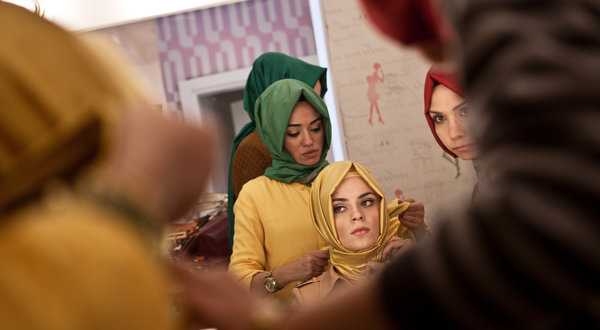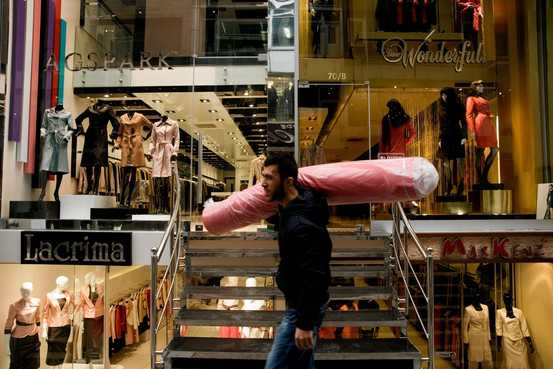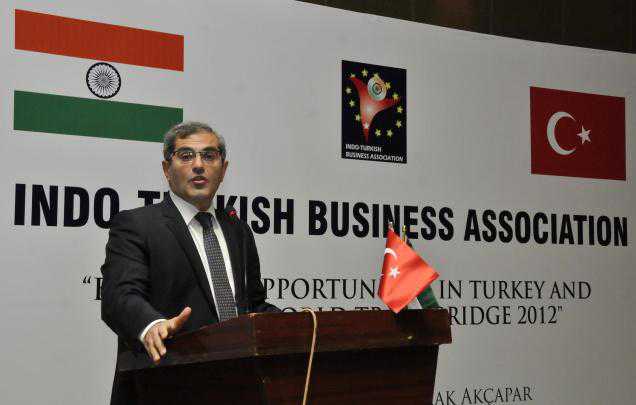
The magazine Ala uses Eastern European models, including this woman from Ukraine, partly because their pay is relatively low.
By DAN BILEFSKY
ISTANBUL — Across a neon-lighted corridor in a hyper-designed modernist loft here, a group of Eastern European models posed coquettishly for a magazine spread, their heads covered in brightly colored scarves.
Except for the religious headgear, the shoot could have been for any glossy fashion magazine. But Ala — called the “Vogue of the veiled” in the Turkish news media — is no conventional publication. In an unlikely fusion of conservative Muslim values and high fashion, it unabashedly appeals to the pious head-scarf-wearing working woman, who may covet a Louis Vuitton purse but has no use for the revealing clothing that pervades traditional fashion magazines.
One of Ala’s founders, Ibrahim Burak Birer, 31, a religious Muslim and a former marketing analyst who favors jeans and designer jackets, said he decided to start the magazine — its name means “the most beautiful of the beautiful” in Turkish — after seeing a transsexual with strap-on breasts in a transparent dress on the cover of an international fashion magazine.
“We realized that there was a gap to be filled for conservative Muslim women in Turkey who have a different worldview,” he said in an interview at Ala’s sleek offices, where young women in head scarves sit hunched over Apple computers. “Until now, most fashion magazines have offered a lifestyle centered on being sexy, being skinny and eating sushi. But not all women dress like those girls from ‘Sex and the City.’ ”
Ala adheres to strict Islam-inspired sartorial guidelines: arms and heads must be covered; tight pants and skirts above the ankle are forbidden. But, Mr. Birer said, the Koran has no prohibition on five-inch stiletto heels. “You can be elegant and sophisticated,” he said. “Female beauty is O.K. as long as it’s not seductive.”
The success of Ala, which has attracted 30,000 subscribers since its founding in June, reflects the rise of an Islamic bourgeoisie in Turkey that has prospered under the Islam-inspired Justice and Development Party of Prime Minister Recep Tayyip Erdogan.
This religious merchant class, which sees nothing incompatible between wearing a head scarf and driving a Mercedes, is altering the society in a country once dominated by a secular elite that banned the wearing of head scarves in public institutions. In Istanbul today, religious businessmen endure six-month waiting lists for $150,000 BMWs, while hip young women in head scarves, skinny jeans and bright red lipstick throng the more than 80 shopping malls in the city. Head scarves are also now ubiquitous on college campuses.
In Ala, page after page of beautiful women in designer head scarves underscore Turkey’s growing comfort with such outward displays of religion.
Yet for all of Ala’s avowed restraint, the magazine and its attention-grabbing images of pouting models staring suggestively in their costly outfits have been criticized by some religious scholars. They argue that regardless of whether a woman is photographed showing off a head scarf or sexy lingerie, such behavior violates Islam, which calls for women not to flaunt their femininity.
via A Turkish Fashion Magazine, Ala, Is Unshy About Showing Some Piety – NYTimes.com.
more :






